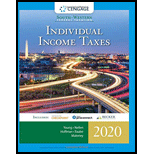
a.
Determine if the tax position of the taxpayer change in the given situation or not.
a.
Explanation of Solution
What is Tax: A tax is a payment levied by the order of Federal, state or local government agencies and collected from the general public to fund the developmental work of the government and not directly linked to the benefits received by the public. A tax must have following characteristics;
- 1. Tax is mandatory payment from the eligible public/enterprise
- 2. Tax is levied by the Government agencies
- 3. Tax has no direct relationship with the benefit received by the taxpayer
Yes, the tax positon for J would change in this situation. J must recognize the rental income and segregate the expenses for personal use and rental use, since J may have to pay transient occupancy tax.
b.
Determine if the tax position of the taxpayer change in the given situation or not.
b.
Explanation of Solution
Yes, the tax position of T would change. T become a self-employed and may have to pay quarterly tax on estimated income and self-employment tax. If she employs any staff members, she may have to withhold payroll tax from her employees and deposit it with the government.
c.
Determine if the tax position of the taxpayer change in the given situation or not.
c.
Explanation of Solution
Yes, the tax position of P would change. The employer of P is entitled deductions for the moving expenses incurred by P but P cannot claim that deduction. P may not be subject to personal income tax in F that was taxable in C.
Want to see more full solutions like this?
Chapter 1 Solutions
Individual Income Taxes
- Hi expert please given correct answer with accounting questionarrow_forwardAccountingarrow_forwardmighty Manny, Incorporated manufactures ice scrapers and distributes them across the midwestern United States. Mighty Manny is incorporated and headquartered in Michigan. It has product sales to customers in Illinois, Indiana, Michigan, Minnesota, and Wisconsin. It has sales personnel only in the states discussed and all these states have adopted Wayfair legislation. Determine the state in which Mighty Manny does not have sales and nexus given the following scenarios:arrow_forward
- Please provide the answer to this general accounting question with proper steps.arrow_forwardNullarrow_forwardThirst Quencher produced 20,000 cases of powdered drink mix and sold 17,000 cases in April. The sales price was $22 per case, variable costs were $14 per case ($10 manufacturing and $4 selling and administrative), and total fixed costs were $55,000 ($40,000 manufacturing overhead and $15,000 selling and administrative). The company had no beginning Finished Goods Inventory. Requirements1. Prepare the April income statement using absorption costing.Known - OI $87,000 2. Determine the product cost per unit and the total cost of the 3,000 cases in Finished Goods Inventory as of April 30. 3. Is the April 30 balance in Finished Goods Inventory higher or lower than variable costing? Explain why.arrow_forward
 Individual Income TaxesAccountingISBN:9780357109731Author:HoffmanPublisher:CENGAGE LEARNING - CONSIGNMENT
Individual Income TaxesAccountingISBN:9780357109731Author:HoffmanPublisher:CENGAGE LEARNING - CONSIGNMENT





